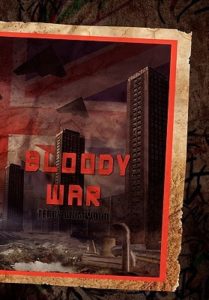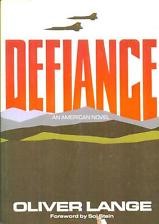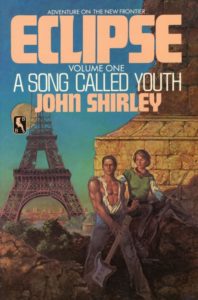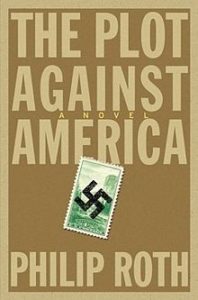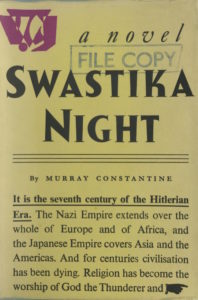As I’m sure most of you are aware, dystopian fiction is quite hot right now. THE HANDSMAID’S TALE by Margaret Atwood is currently number three on Amazon.com’s political fiction ranking, followed by George Orwell’s 1984 (#5) and Sinclair Lewis’s IT CAN’T HAPPEN HERE (#8). BRAVE NEW WORLD and FAHRENHEIT 451 have likewise received renewed popularity in recent weeks. For those unfamiliar with those books, all involve dystopias, or places in which everything is bad. The reason for their recent popularity isn’t hard to discern given the current state of the union.
Despite their overpowering bleakness, these books would seem to offer some degree of reassurance and even comfort to modern readers, helping put our current situation in perspective by showing how things haven’t gotten that awful (yet!). They’re also more fun to read than, say, THE ORIGINS OF TOTALITARIANISM or THE RISE AND FALL OF THE THIRD REICH.
In that spirit I’ll offer up a few more examples of fiction—and one alleged nonfiction tome—that offer insight into today’s world but aren’t as well-known as the above-mentioned classics. Some of the following novels are dystopian themed and some aren’t, but all offer plenty of provocative insight, and prove that, whatever might befall us in the coming years, we can’t say we weren’t warned!
First up is THE AERODROME by Rex Warner. Initially published back in 1941, its grown quite dated over the ensuing decades (the likely reason it’s so little known) but still packs a punch. It’s notable for its presentation of the deadly allure of fascism in its allegorical story of an English lad drawn to an Air Force regiment that promotes near-superhuman degrees of strength and regimentation. This regiment also encourages the abolition of family and the social order, which places it directly at odds with the tactics of today’s fascists (for whom the term “family values” is used as a war cry). But the novel’s lesson remains pertinent, especially in light of the “fascism chic” that came into vogue with the ascension of Donald Trump’s political career.
I’m not sure that 2011’s English-centric BLOODY WAR by Terry Grimwood has any direct connection to our current situation, but it is the bleakest dystopian novel I know of, a pitiless vision of a catastrophic war that destroys England (and, it’s implied, much of the rest of the world). It tells the story of Pete, a Londoner who finds his comfortable life thrown into turmoil upon learning of a secret war his country is fighting against a shadowy force known only as the EoD, or Enemies of Democracy. Nobody seems to know exactly who the EoD are or where they come from, only that they apparently want to do everyone in. Pete quickly grows acclimated to this new reality upon learning of the draconian security measures adopted by the government—and narrowly surviving a bombing that takes out much of his workplace. If the above sounds downbeat, be advised that it’s merely a warm-up for the unpleasantness to come!
Unlike most of the other books on this list, DEFIANCE by Oliver Lange hails from the right end of the political spectrum, being a libertarian-minded account of an artist forced to take up arms in the wake of a communist takeover of the United States. The novel, initially titled VANDENBERG, received a fair amount of attention upon its initial publication in 1971, primarily because it was one of the first examples of its type. Obviously it’s no longer as unique as it once was, nor is it as exciting; indeed, I found it pretty dull, taken up as it is largely with dialogue that far outpaces the action. Yet the issues raised in these pages remain quite pertinent, particularly an observation about the Cuban missile crisis, when Americans “marched as one man to the confrontation…But this time around, it didn’t work that way—what happened?” and another about the lack of any genuine outrage in modern America: “I defy you to find nowadays any of the implacable ferocity that must have been extant in the Jacobin, Cromwellian, pre-Revolutionary American, and Czarist-related societies.” Of course in both those quotes the author was referring to early seventies America, but they apply equally, or perhaps even more so, today.
It’s a funny thing about John Shirley’s ECLIPSE, a politically minded entry in the 1980s cyberpunk cannon: upon first reading it as a teenager I focused on the book’s colorful and picturesque descriptions rather than the political elements, but now I find I’m having the opposite reaction—not least because like most eighties-era cyberpunk lit it hasn’t dated particularly well. The first volume in a trilogy (I haven’t read the subsequent volumes), it’s set in an apocalyptic future Europe decimated by nuclear war. The details of this world aren’t nearly as wild or as unique as they once seemed, but what still startles are Shirley’s descriptions of the Second Alliance, an ultra-right wing paramilitary organization that uses a toxic blend of racism and religion to further its ends—one area in which this novel has proven disturbingly prophetic.
ON THE MARBLE CLIFFS by Ernst Junger, a fascist parable that was initially published in 1939, can be viewed as the German answer to THE AERODROME. About a peaceful botanist whose life is upturned by a warmongering dictator who decimates the botanist’s house and the entire village in which he resides, the novel is very clearly referencing the Nazis—a mighty ballsy move considering that the Nazis were in power when it first appeared in its native Germany (the author’s famously pro-war views and the fact that Hitler admired his writing saved the book from oblivion). It’s far from an easy read, with the proceedings bogged down by the narrator’s obsession with all things botanical, which he expounds upon at great length, even amid the most dramatic passages. This, however, appears to be a crucial part of the author’s critique: that in 1930s-era Germany people allowed themselves to be distracted by frivolities as the Nazis gained power, until it was too late to effectively fight back. A pretty sobering message, I’d say, considering that such apathy isn’t exactly foreign to modern America, a reported 47 percent of whose populace sat out the 2016 election.
THE PIT by Gene Church and Conrad D. Carnes is a (purportedly) nonfiction account from 1972 that reads like an especially outrageous work of fiction. Its subject is a weekend group encounter organized by an outfit called Holiday Magic (which in 1974 was dissolved by the Federal Government for deceptive trade practices) and run by a fellow named Ben Gay. According to co-author author Gene Church, the group encounter, which takes place in a nondescript California hotel room, entailed beating, intimidation, sensory deprivation, crucifixion and shit eating. The ringleader of it all was the aforementioned Mr. Gay, a wealthy businessman who comes off as a narcissistic bully throughout—not unlike a certain somebody we all know, as is especially evident in a mid-book passage in which Gay reveals his intention to become President of the United States, which he reckons will occur, appropriately enough, in the year 1984. Of course we all know that coronation didn’t actually happen, but something very like it did occur some 32 years later!
THE PLOT AGAINST AMERICA is an attempt at alternate history science fiction by Philip Roth. The novel received some positive attention upon its release back in 2004, even though it’s a bit limp in most respects. The setting is an alternate universe 1940, in which Charles Lindbergh is elected president of the United States and, with help from his partner Adolph Hitler, allows his anti-Semitic tendencies full reign. It’s all seen through the eyes of the seven year old Philip Roth, whose family, being Jewish, is naturally quite apprehensive about Lindbergh’s presidency. I say much more could have been done with this set-up than Roth attempts, but its disquieting parallels with our current situation—a fascistic president under the control of a foreign power hostile to the US—are too obvious to ignore (FYI, Roth’s own thoughts on the novel and President Trump can be found here).
SWASTIKA NIGHT, initially published in 1937 and credited to “Murray Constantine”—the actual author was the renowned feminist novelist Katherine Burdekin—was one of the first-ever If-the-Nazis-won-the-war accounts. It’s far from the “masterpiece” some have dubbed it, being burdened with an uneventful narrative about an Englishman falling under the spell of a powerful Nazi operative. In this novel’s future, you see, the world has long since fallen under Nazi domination, with women reduced to braindead slaves and men having to resort to homosexuality in order to express affection. Yes, SWASTIKA NIGHT far outdoes THE HANDMAID’S TALE in feminist outrage, and it also contains the politically incorrect suggestion that the women of this nightmare future unwittingly engineered their own fate, with the hatred men feel for them being a subconscious reaction to the fact that womankind allowed itself to be so easily cowed. Given that 53 percent of white American women voted for Trump, who in turn hasn’t exactly been accommodating to female issues, I’d say that point is worthy of at least some consideration…


